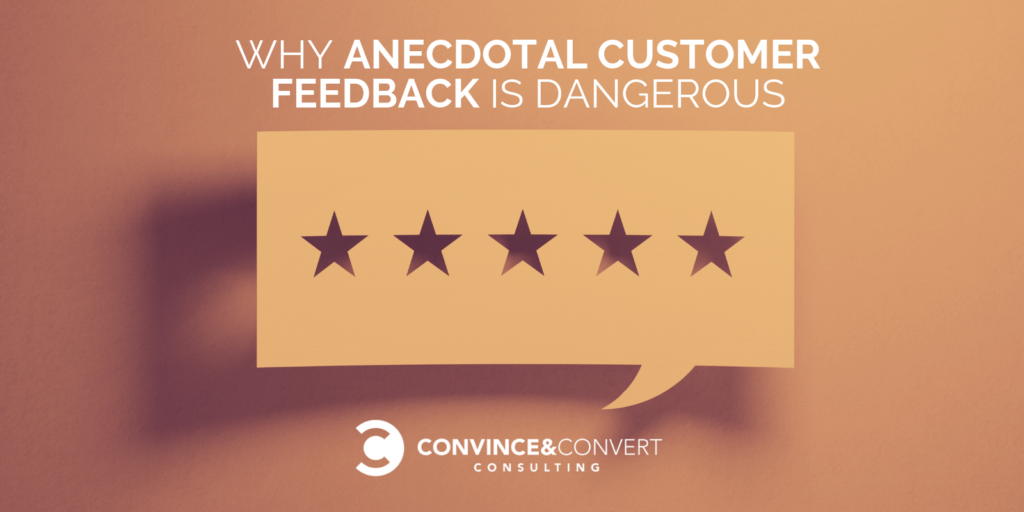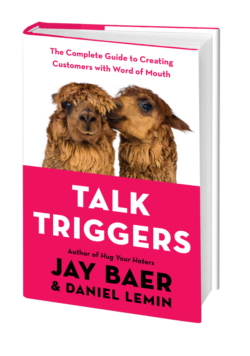
Customer feedback is a gift. I believe that. I wrote a whole book about it called Hug Your Haters.
Indeed, customers are doing you an enormous favor by taking the time to alert you to a problem when it occurs, or to their happiness, when that’s the outcome.
The value of feedback is heightened today, as customer experience sways purchase decisions more than ever. Thus, listening to and analyzing customer feedback is crucial to make sure the company meets or exceeds ever-escalating expectations.
But making customer experience changes based on customer feedback isn’t always wise, as you’ll see in this article.
My friend Tom Webster has said many smart things, but one of my favorites is this:
The plural of anecdote is not data.
The plural of anecdote is not data.
Click To Tweet
An anecdote is just a story. And too often we use stories, which began as customer feedback, to shape our company operations.
This is dangerous. But it happens all the time.
How does this occur? How do we end up in a place where listening to customer feedback may actually be harmful?
When You Don’t Look Hard Enough for Customer Feedback
As discussed in Hug Your Haters, your customers are talking about you in more places and in greater number than you probably know. For instance, the overwhelming majority of tweets about a business do NOT tag the business in question. Also, there is a lot of chatter about companies in discussion boards and forums, where many businesses do not actively listen.

The result of not listening hard enough is that the volume of customer feedback is diminished. Consequently, when you haven’t collected all that much feedback from customers, the feedback you DO get is magnified in its importance. In this scenario, it’s easier to spin specific pieces of feedback into anecdotes: stories that you can use to shape the customer experience narrative how you prefer.
When You Embrace the Outliers of Customer Feedback
We remember really angry customers. And we remember customers who are incredibly happy and satisfied. This is human nature: we discuss different and ignore average.
But, when you’re looking at your customer feedback and trying to decide what it all means, it’s disproportionately easy to remember the five stars and the one stars, turning that sliver of the whole into anecdotes and calling them data.
Danger: Customer Feedback Ahead
Why is this a problem? What’s the downside of using just a few customer viewpoints to help shape how and why you do things in your company?
Because truth requires math. An anecdote — even a great and powerful one — is just a blip. One (or even a handful) of customers should never shape your customer experience decisions, regardless of how persuasive, powerful, or poignant their feedback. The opinions of one customer, in one circumstance, in one moment in time, based on their specific experience is just that: ONE experience.

And that can create feedback that is VASTLY different and dangerously contradictory.
I learned this lesson quite clearly over the past 30 days.
When Customer Feedback Collides
 My newest book is called Talk Triggers: The Complete Guide to Creating Customers with Word of Mouth. Written with Daniel Lemin, Talk Triggers is comprehensively researched and includes the 4-5-6 system for creating word of mouth strategies that acquire customers (4 Requirements of a Talk Trigger; 5 Types of Talk Triggers; 6-step Process for creating Talk Triggers).
My newest book is called Talk Triggers: The Complete Guide to Creating Customers with Word of Mouth. Written with Daniel Lemin, Talk Triggers is comprehensively researched and includes the 4-5-6 system for creating word of mouth strategies that acquire customers (4 Requirements of a Talk Trigger; 5 Types of Talk Triggers; 6-step Process for creating Talk Triggers).
Because the book is about word of mouth, Daniel and I decided the book should have a feature that stands out; something to create conversation among readers.
We included three. First, the cover is hot pink and features alpacas. Second, the inside has tear-out pass-along cards readers can use to recommend the book. And third, the book has an iron-clad guarantee. The back of Talk Triggers reads:
If you buy this book and do not love it, go to TalkTriggers.com and send the authors a note. They will buy you ANY other book of your choosing.
So far, out of MANY thousands of readers, we’ve had just two redemptions of this very special guarantee.
And they taught me just how dangerous anecdotal customer feedback can be.
The First Negative Customer Feedback
Book has been out five months, and we get our very first request for a different book, from Gary. Said he didn’t like Talk Triggers. Wants a copy of Mark Schaefer’s Marketing Rebellion instead. Good choice. We get his proof-of-purchase, and send him the book. Before we ship, we ask him what he found lacking in our book. Gary says:
The number of examples were few compared with the number of companies in the country.
Fair enough, Gary. Although it would be a long book indeed if we aimed to write case studies about all the companies in the country.
The Second Negative Customer Feedback
Fast forward a month. James emails us. Said he didn’t like the book. Requests a $200, out-of-print book about digital marketing instead. We weren’t too thrilled about that, but we bought it for him, and then asked what he didn’t like about Talk Triggers? James replied:
Too many case studies. The book relied on them way too much.
James, meet Gary. Gary, meet James. You guys should get along great.
And that’s why anecdotal customer feedback can be dangerous. Same book. Exactly opposite feedback.
Make your customer experience decisions based on math, not stories.
Make your customer experience decisions based on math, not stories.
Click To Tweet
The post Why Anecdotal Customer Feedback is Dangerous appeared first on Convince and Convert: Social Media Consulting and Content Marketing Consulting.
from Convince and Convert: Social Media Consulting and Content Marketing Consulting http://bit.ly/2uYy4Tb



No comments:
Post a Comment